When choosing a commercial solar installer, start by researching local options and reading customer reviews to gauge reputation. Verify their credentials, such as licenses and certifications like NABCEP, ensuring they comply with legal standards. Review their experience and request a portfolio of past projects for insight into their capabilities. Compare warranty and maintenance offerings to understand long-term support. Assess product quality with emphasis on efficiency ratings and warranties on panels. Analyze customer feedback for consistent themes, and inquire about installation practices to match your project's requirements. There's more to evaluate, including financial incentives that could benefit your decision.
Research Local Installers
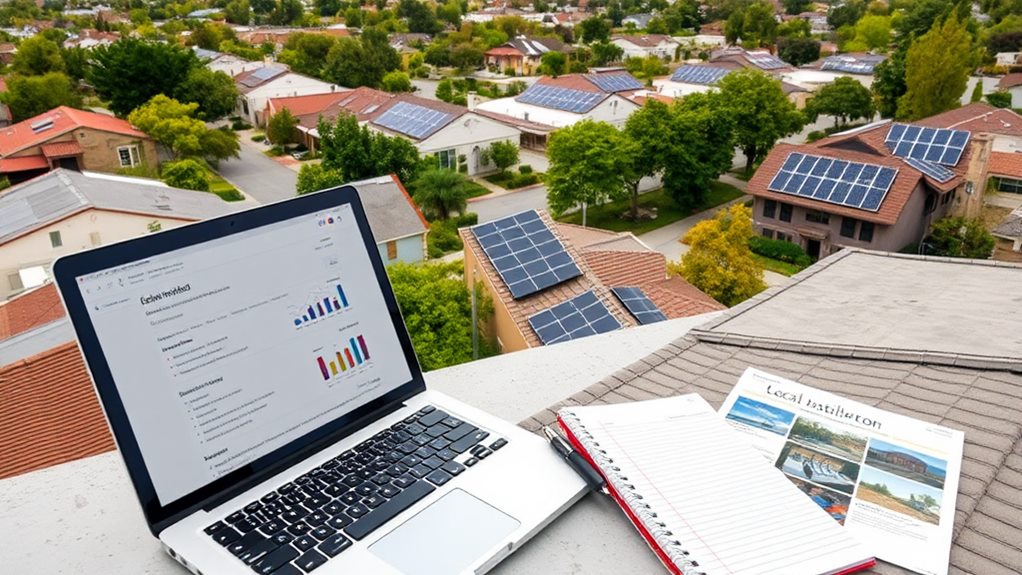
When you're ready to invest in solar energy for your business, researching local installers is a crucial first step. Start by searching for reputable commercial solar installers in your area. Utilize online directories and platforms like Google and Yelp to find customer reviews and ratings. These insights can help you gauge the experiences of other businesses with various solar companies.
Additionally, consider evaluating the installer credentials and experience to verify they meet industry standards and regulations. Check for any industry recognition or awards that highlight an installer's credibility and commitment to quality service. These accolades often reflect their dedication to excellence in the solar field.
Additionally, look into their completed projects and case studies to assess whether they've handled installations that align with your business's specific needs. Engaging with local business networks or community groups can provide valuable recommendations and firsthand experiences, further enriching your research.
As you compile this information, you'll be better equipped to make an informed decision. Remember, a thorough investigation of local installers not only verifies you choose a competent provider but also sets the foundation for a successful solar installation that meets your business goals.
Check Credentials and Certifications
When choosing a commercial solar installer, it's vital to verify their local licenses to guarantee they're operating legally in your area.
A reputable installer should also be well-versed in commercial solar solutions tailored for businesses of all sizes.
Additionally, confirm that they hold relevant certifications, like NABCEP, which indicate they meet national standards for solar installation.
Don't overlook compliance records, as these can provide insight into the installer's adherence to industry regulations and best practices.
Verify Local Licenses
Before selecting a commercial solar installer, it's vital to verify their local licenses and certifications to confirm you're making a safe and compliant choice. Start by checking that the installer holds the necessary local licenses, including an electrical contractor's license and potentially a general contractor's license. This guarantees compliance with regional regulations and adherence to safety standards.
Additionally, consider utilizing online directories and platforms like EnergySage for price comparisons, which can help you find qualified installers at competitive rates.
Furthermore, look for certifications like NABCEP (North American Board of Certified Energy Practitioners). This certification indicates that the installer has met rigorous industry standards for solar installation, further confirming their expertise.
It's also important to verify that the installer carries general liability insurance. This insurance protects you from potential damages or accidents that may occur during the installation process, providing peace of mind.
Utilize state licensing boards or online resources to validate the authenticity of the installer's licenses and certifications. Make sure they're up to date and in good standing.
Confirm Installer Certifications
After verifying local licenses, confirming installer certifications is a key step in ensuring you choose a qualified solar installer.
Start by checking if the installer holds the necessary business licenses required by local authorities, as this can include specific licenses for electrical work. Additionally, inquire about available solar energy tax credits that can help reduce your installation costs.
Next, look for installers with NABCEP (North American Board of Certified Energy Practitioners) certification, which indicates they adhere to national standards in solar installation practices. This certification is a strong signal of professionalism and expertise.
It's also essential to verify that the installer carries general liability insurance and workers' compensation insurance. These protections not only safeguard your investment but also protect against potential issues during the installation process.
Additionally, check if the installer is a member of the Solar Energy Industries Association (SEIA). Membership in this professional organization reflects a commitment to industry best practices and ethics.
Check Compliance Records
Checking compliance records is essential for guaranteeing you choose a reliable commercial solar installer. Start by verifying that the installer possesses the necessary licenses required by local authorities, such as a C-10 License for electrical contractors. This helps guarantee compliance with applicable regulations.
Next, look for certifications from recognized organizations like the North American Board of Certified Energy Practitioners (NABCEP). These certifications indicate adherence to national standards in solar installation practices.
Additionally, review the installer's history for any regulatory compliance violations; a clean record suggests a commitment to ethical business operations. Investigate whether the installer is a member of professional organizations, such as the Solar Energy Industries Association (SEIA). Membership can be a sign of their dedication to best practices and industry standards.
Lastly, confirm that the installer carries general liability and workers' compensation insurance. This insurance protects you against potential property damage and injuries during the installation process.
Review Experience and Portfolio
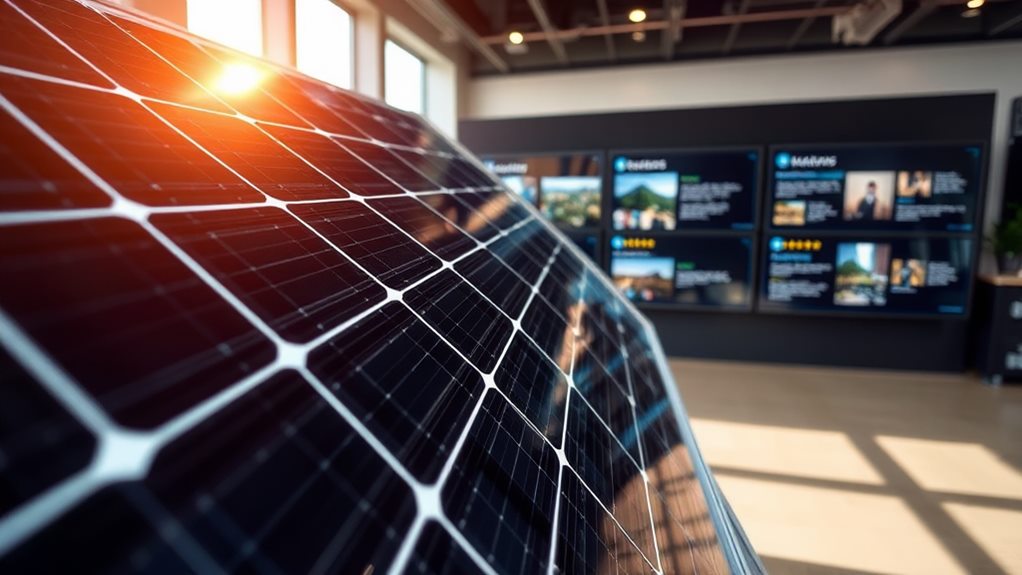
Evaluating a commercial solar installer's experience and portfolio is vital for guaranteeing a successful project. Start by requesting a portfolio that showcases at least 20 completed projects. This will help you assess their experience and versatility in handling various installation types.
Look for case studies that detail specific project challenges and the solutions implemented, as these demonstrate the installer's problem-solving capabilities in real-world scenarios.
Additionally, check the average installation completion time for their previous projects. This information can give you insight into their efficiency and reliability in meeting deadlines.
It's important to verify the installer has experience with projects similar in scale and complexity to yours, as relevant experience can greatly influence project success.
Compare Warranty and Maintenance Options
When considering commercial solar installers, understanding their warranty and maintenance options is crucial for protecting your investment. Warranties typically range from 1 to 25 years, covering both parts and labor, which can save you significant costs if repairs are necessary.
Here are three key aspects to evaluate:
- Warranty Options: Verify the warranty covers defects and failures thoroughly, providing you with long-term coverage.
- Installer Reputation: Research the installer's reputation for honoring warranty claims. Companies with a proven track record in customer service are more likely to uphold their commitments.
- Maintenance Services: Assess the availability and scope of maintenance services offered. Regular upkeep enhances system performance and longevity, complementing your warranty coverage.
Additionally, familiarize yourself with the specifics of the warranty terms, such as coverage details, exclusions, and the process for claiming warranty support.
This knowledge can help you avoid potential pitfalls and verify you're making an informed decision. By carefully comparing warranty and maintenance options, you'll be better equipped to choose an installer that not only meets your energy needs but also stands by their work and supports you throughout the system's life.
Assess Product Quality
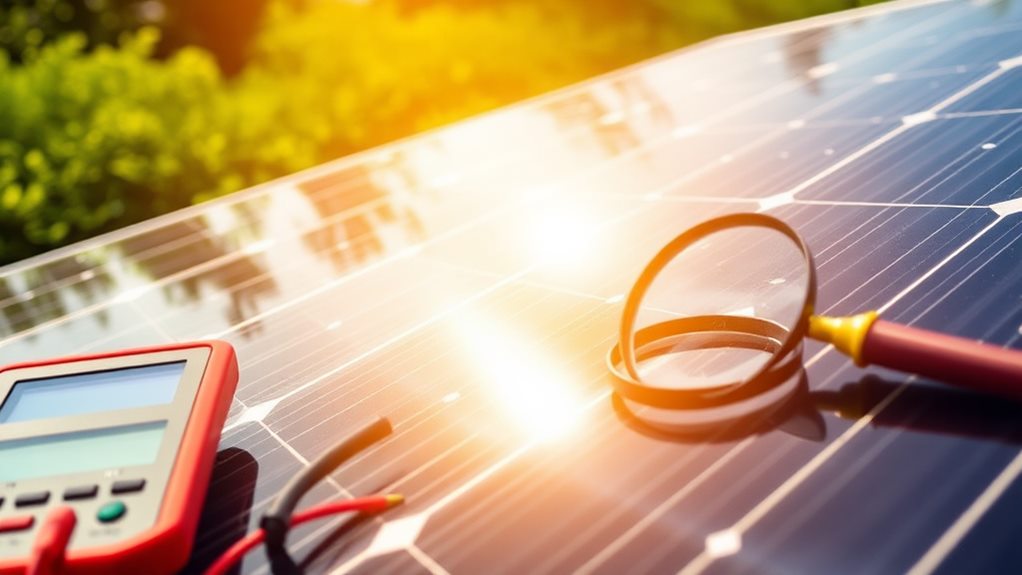
When evaluating product quality, you should pay close attention to the efficiency ratings of solar panels, as higher ratings allow for greater electricity generation in commercial settings.
Additionally, consider the materials used; monocrystalline silicon panels often provide superior performance and durability compared to other types.
Panel Efficiency Standards
Understanding panel efficiency standards is essential for selecting the right solar installation for your needs. When you're evaluating solar panels, you'll want to focus on their ability to convert sunlight into usable electricity. High-efficiency panels typically achieve efficiencies of 20% or higher, while standard panels range from 15% to 18%.
Here are three key points to take into account:
- Monocrystalline Solar Panels: These are recognized as the most efficient type, offering higher power output per square meter due to their single-crystal structure. They're particularly beneficial if space is limited.
- Performance Standards: Verify that the panels meet rigorous performance standards, such as those set by the International Electrotechnical Commission (IEC). This certification indicates reliability in energy production over their lifespan, usually 25 to 30 years.
- Environmental Factors: Remember that factors like temperature, shading, and installation angle can impact efficiency. Panels are often tested under Standard Test Conditions (STC) to provide consistent efficiency ratings.
Material Quality Assessment
In your quest for a reliable solar installation, evaluating the material quality of solar panels is essential. Start with a thorough material quality assessment, focusing on the manufacturing materials used.
Monocrystalline panels are often a better choice due to their higher durability and efficiency ratings compared to polycrystalline and thin-film alternatives. Aim for solar panels with efficiency ratings above 20%, as they convert more sunlight into electricity, maximizing energy production and savings over time.
Next, verify that the solar products you consider meet industry standards and certifications, such as those from the International Electrotechnical Commission (IEC) and Underwriters Laboratories (UL). These certifications guarantee safety and performance reliability.
Also, pay attention to warranty offerings; reputable manufacturers typically provide warranties lasting 25 years or more, reflecting their confidence in product quality and longevity.
Evaluate Payment Flexibility
Evaluating payment flexibility is crucial when choosing a commercial solar installer. You need to take into account various payment options that suit your budget and financial strategy. By exploring different financing options, you can find a solution that minimizes your initial investment while guaranteeing long-term benefits.
Here are three key factors to evaluate:
- Diverse Payment Options: Look for installers who offer cash purchases, loans, leases, and Power Purchase Agreements (PPAs). Each has its advantages, so choose what aligns with your financial goals.
- Customized Financing Plans: Inquire if the installer provides low or zero down payment options. This can greatly ease the initial financial burden of your solar installation.
- Transparent Pricing Structures: Make sure the installer maintains clear and transparent pricing, free from hidden fees or ambiguous terms.
Additionally, assess any available incentives, such as federal and state tax credits. These can reduce the overall cost and improve your return on investment.
Analyze Customer Reviews
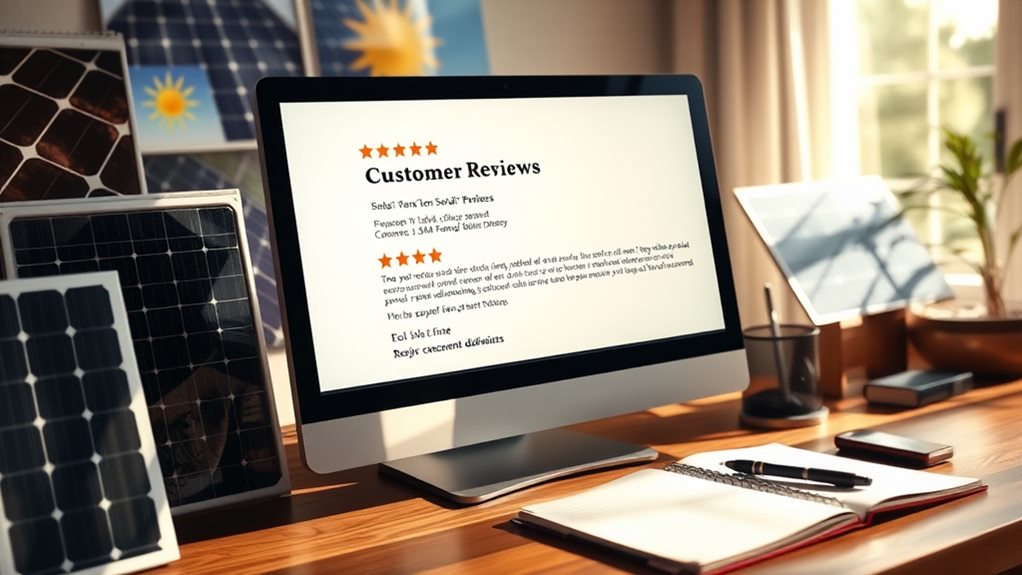
When analyzing customer reviews, you'll want to focus on platforms like Google and Yelp to get a clear picture of an installer's reputation. Look for ratings of 4 stars and above, as they often indicate quality service and overall satisfaction.
Pay attention to specific feedback regarding the installation process, project management, and the responsiveness of the installer. This information can help you identify strengths and weaknesses that may affect your decision.
Additionally, analyze customer reviews for recurring themes in negative feedback. Customer complaints about missed deadlines or unresolved issues can signal potential risks in choosing that installer. These patterns often provide insight into how the installer holds up under pressure and their commitment to customer service.
Seek out case studies or testimonials detailing successful projects similar to yours. These examples serve as evidence of the installer's capabilities and reliability.
Finally, consider the volume of reviews; a higher number often indicates a more established reputation, while a lack of reviews might suggest a newer or less experienced company.
Inquire About Installation Practices
When choosing a commercial solar installer, it's vital to inquire about their installation practices.
You should compare their methodologies, assess the expertise of their contractors, and evaluate how they manage the project from start to finish.
This will help guarantee that the installation aligns with your building's needs and meets industry standards for quality and efficiency.
Installation Methodologies Comparison
Choosing the right installation methodology for your solar system can greatly influence both its performance and your overall investment. Understanding the different options available is vital for meeting your energy needs effectively.
Here are three primary installation methodologies to evaluate:
- Rooftop Installations: These are often the most cost-effective and space-efficient. By utilizing existing structures, you can save on additional land requirements while generating energy directly on-site.
- Ground-Mounted Systems: These systems offer flexibility in panel orientation, allowing for the best sun exposure. However, they typically require more land and may involve more extensive site preparation, which can increase costs.
- Carport Installations: Combining solar energy generation with shaded parking, these systems are ideal for businesses with available parking lots. They provide dual benefits, maximizing space while enhancing customer experience.
Each installation method can greatly impact the overall efficiency and output of your solar system.
As a result, it's important to discuss site-specific recommendations with potential installers to determine the best fit for your property and energy requirements.
Contractor Expertise Assessment
Evaluating a contractor's expertise is essential for guaranteeing your solar installation meets your expectations and energy needs. Start by inquiring about the contractor's experience with specific types of installations, particularly commercial versus residential. This contractor expertise evaluation will help you determine if they possess the relevant skills for your project.
Next, ask for details on their installation practices, including the type of equipment and technologies they utilize. This information can offer insight into their commitment to quality and efficiency.
It's also important to review their quality assurance measures during installation, as these practices can greatly affect the performance and longevity of your solar system.
Additionally, consider their approach to post-installation support and maintenance. A reliable contractor should provide ongoing service to make sure your system remains functional over the long term.
Also, explore their project management processes, including timelines and communication strategies. Evaluating these factors will give you a clearer picture of their reliability and ability to meet deadlines.
Project Management Evaluation
A well-structured project management approach is essential for a smooth solar installation process. When evaluating potential installers, you should inquire about their processes regarding scheduling, resource allocation, and communication throughout the installation timeline.
Understanding their experience with similar commercial projects can also give you insight into their ability to manage complexity and scale effectively.
Here are three key areas to explore during your evaluation:
- Handling Challenges: Ask how they address challenges or delays that may arise during the installation. Their strategies for minimizing disruptions to your business operations are critical for maintaining productivity.
- Project Management Tools: Inquire whether they use project management software to track progress. Transparency in communication is important, and effective tools can help keep you informed throughout the process.
- Post-Installation Support: Assess their post-installation support and maintenance plans. Effective project management extends beyond installation, ensuring long-term system performance and reliability.
Understand Solar Technology
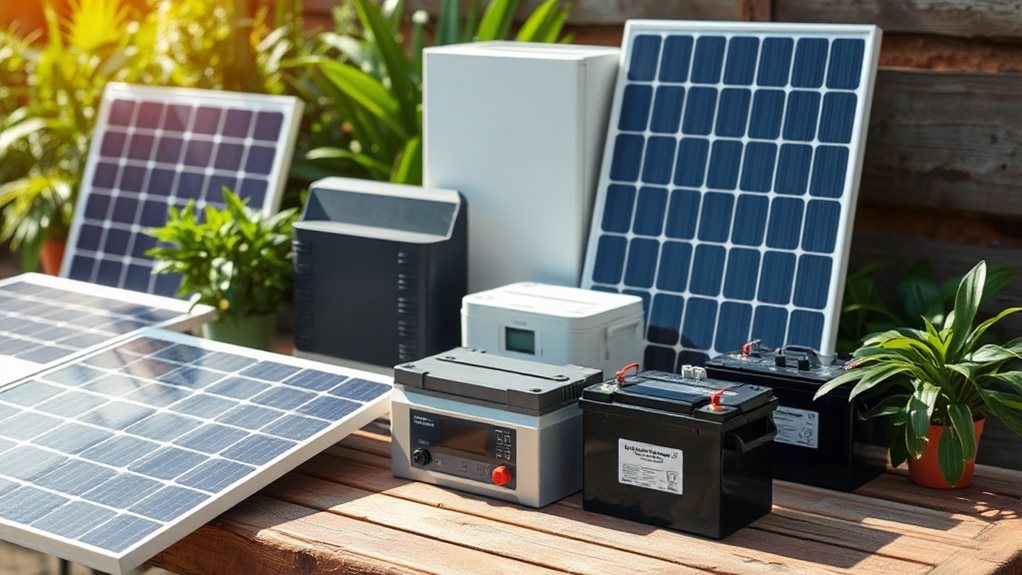
Solar technology is revolutionizing how businesses harness energy, and understanding its fundamentals is essential for making informed decisions. At the heart of this technology are photovoltaic (PV) systems, which convert sunlight directly into electricity using semiconductor materials, typically silicon-based.
When considering solar panel installation, you'll encounter three main types of solar panels: monocrystalline panels, known for their high efficiency and sleek appearance; polycrystalline panels, which are more budget-friendly yet slightly less efficient; and thin-film panels, recognized for their lightweight and flexible nature, though they generally lag in efficiency.
Inverters play a critical role in solar energy systems by converting the direct current (DC) produced by solar panels into alternating current (AC), which powers most commercial electrical systems.
Battery storage options, such as lithium-ion batteries, enable businesses to store excess energy generated during the day, providing power during peak demand or outages, thereby enhancing energy management and reliability.
Look for Financial Incentives
When considering a solar installation for your business, it's crucial to explore the various financial incentives available to you.
These incentives can notably reduce your costs and enhance your return on investment when investing in solar energy solutions.
Here are three key incentives you should look into:
1. Federal Solar Tax Credit: This credit can cover up to 30% of your project costs, alleviating much of the financial burden associated with solar installation.
2. Local Solar Programs: Many states offer additional financial incentives, such as rebates or grants, which can further decrease your upfront costs.
Researching these local programs can yield substantial savings.
3. Net Metering and Property Tax Exemptions: Net metering allows you to earn credits for excess energy produced, lowering your electricity bills and providing potential revenue.
Additionally, some local governments offer property tax exemptions, so you won't face increased taxes for the added value of your solar system.
Final Thoughts
In choosing a commercial solar installer, you're not just investing in technology; you're investing in a partnership that can illuminate your path to sustainability. By meticulously considering factors such as experience, product quality, and customer feedback, you can guarantee that your choice won't just shine brightly today but will endure for years to come. Remember, this decision impacts your energy future, so take the time to select an installer who aligns with your vision and values.

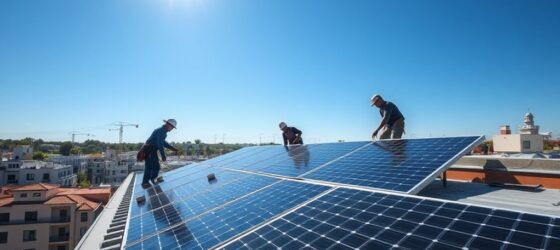
Recent Comments